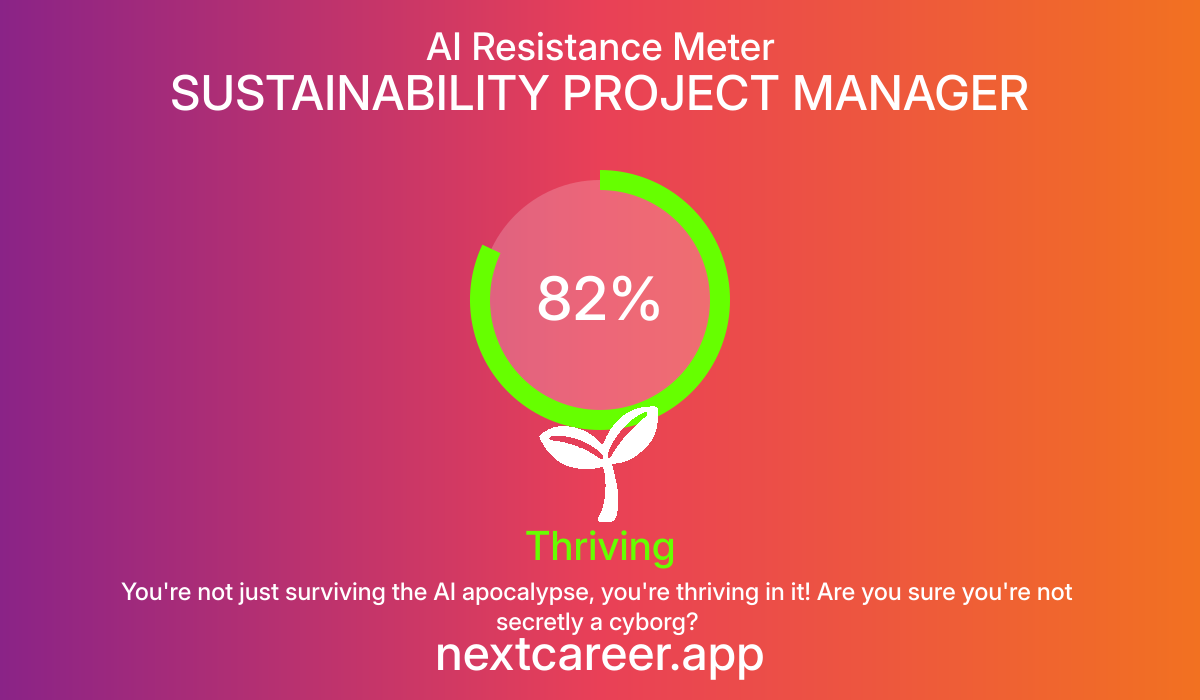AI Resistance for SUSTAINABILITY PROJECT MANAGER
AI Resistance Score
AI Resistance Meter
Thriving
SUSTAINABILITY PROJECT MANAGER
You're not just surviving the AI apocalypse, you're thriving in it! Are you sure you're not secretly a cyborg?
The role of a Sustainability Project Manager involves a combination of strategic planning, stakeholder management, regulatory compliance, and creative problem-solving to advance sustainable initiatives in organizations. Given the complexity and multidisciplinary nature of sustainability, this job requires skills across cognitive tasks, emotional intelligence, and creative thinking, which traditionally demonstrate higher resistance to AI automation. Moreover, while AI can offer tools to enhance operational efficiency and data analysis, the human elements of negotiation, advocacy, and adaptability within varying regulatory frameworks remain critical to this role.
The role of a Sustainability Project Manager involves a combination of strategic planning, stakeholder management, regulatory compliance, and creative problem-solving to advance sustainable initiatives in organizations. Given the complexity and multidisciplinary nature of sustainability, this job requires skills across cognitive tasks, emotional intelligence, and creative thinking, which traditionally demonstrate higher resistance to AI automation. Moreover, while AI can offer tools to enhance operational efficiency and data analysis, the human elements of negotiation, advocacy, and adaptability within varying regulatory frameworks remain critical to this role.
Key Factors
- Cognitive Tasks: AI can assist in data analysis, forecasting, and providing insights which aids in decision-making, thereby augmenting human cognitive capacities rather than replacing them.
- Emotional Intelligence: Involves relationship management, negotiation, and understanding stakeholder motivations, which are inherently human-centric activities and resistant to automation.
- Physical Skills: Minimal impact as the role is primarily intellectual and strategic rather than manually intensive.
- Creative Thinking: Involves designing innovative sustainability projects and solutions, an area where human creativity and contextual understanding are difficult for AI to replicate.
Human Advantages
- Complex problem-solving
- Stakeholder engagement and negotiation
- Understanding of cultural and regulatory nuances
- Creative design of sustainability initiatives
AI Vulnerabilities
- Data analysis and risk assessment tools
- Legal and regulatory compliance automation
Recommended Actions
- Enhance AI literacy to leverage tools for data analysis and project forecasting.
- Continuously update knowledge on emerging sustainable technologies and regulations.
- Focus on developing soft skills such as negotiation, collaboration, and leadership.
- Emphasize creative and strategic thinking to design innovative sustainability initiatives.
- Engage in cross-disciplinary learning to integrate diverse perspectives and skills.
In the near-term, AI will become a vital tool for Sustainability Project Managers, offering enhanced data insights and operational efficiency. Long-term, the role is expected to evolve with increased integration of AI systems in managing data-heavy aspects, while the managerial and creative sides of the role, including policy advocacy and human-centric project design, will continue to demand a strong human presence. Societal shifts towards sustainability may increase the relevance and demand for this job, solidifying its resistance to automation.
